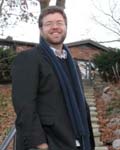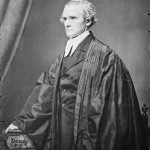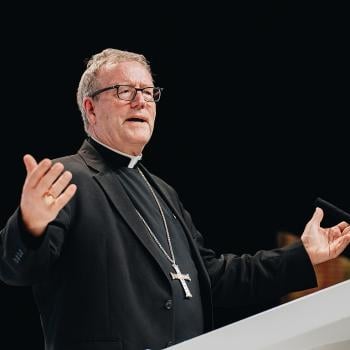Noreen Herzfeld A reviewer of my recent book Technology and Religion wrote that one weakness of the book was that I did not clearly delineate between religion and ethics, and that the book would have been more properly titled "Technology and Ethics." In pondering that criticism, I found myself wondering what the reviewer might have said to Moses: "Hey Mose, enough with telling us what to do or not do -- give us ten philosophical concepts about God." Or to Jesus, "What's all this about feeding the hungry or giving up one's cloak -- we want theology." Which is to say, religion at its source deals less with concepts than with actions. It tells us what to do and, as the ancient monastic tradition has it, it is in the doing that we come to find out what we believe.
A reviewer of my recent book Technology and Religion wrote that one weakness of the book was that I did not clearly delineate between religion and ethics, and that the book would have been more properly titled "Technology and Ethics." In pondering that criticism, I found myself wondering what the reviewer might have said to Moses: "Hey Mose, enough with telling us what to do or not do -- give us ten philosophical concepts about God." Or to Jesus, "What's all this about feeding the hungry or giving up one's cloak -- we want theology." Which is to say, religion at its source deals less with concepts than with actions. It tells us what to do and, as the ancient monastic tradition has it, it is in the doing that we come to find out what we believe.
So what are we to do? If we look at the figure of Jesus in the Gospel of Mark we find that the majority of his actions are to "heal the sick and help the suffering." In the book of Acts the disciples follow the same path. Science, through its offspring of technology, gives us tools to do likewise. Pharmaceuticals, genetic engineering, modern prostheses, new crops, nanotechnology -- these all give us new ways to heal the sick and help the suffering. Even the humble solar flashlight is a life changer for many in rural Africa, allowing children to study at night or frighten away wild animals. Peter Gatuoth, a Sudanese refugee writes: "In case of thief, we open our solor and the thief ran away. If there is a sick person at night we will took him with the solor to health center." Science and technology give us new ways to live our faith and show love to our neighbor.
But who is our neighbor? When asked this question, Jesus told the story of the good Samaritan, a story that enlarged one's duties beyond the expected boundaries of nation and clan. Technology enlarges the neighborhood even further. The advent of new communication, information, and transportation technologies means we encounter one another, not only on the road, but in cyberspace and over the airwaves. We live in a world in which transactions happen on a planetary scale in real time. Money moves from the halls of Wall Street to the trading floors of Singapore with the click of a mouse. A protest in Beirut appears on television screens from Buenos Aires to Tokyo as it occurs. Pollution drifts from China to the forests of British Columbia. Western induced melting in the Arctic threatens the Maldives. The global is now local; the road to Jerusalem is everywhere.
Thus science expands our love for one another, by giving us new tools to express that love and by enlarging our neighborhood, giving us more people whom we are called to love. We can, and often do, fail at this task, using our technologies to widen the gap between rich and poor, or to perpetuate division and war. Our technologies often seem to face us with greater challenges than in the past. Yet, at root, the challenge is what it always has been -- to love all, and exclude none. Advances in science and technology have simply helped us to see the magnitude of that call.
Noreen Herzfeld is the Nicholas and Bernice Reuter Professor of Science and Religion at St. John's University in Collegeville, Minnesota. She holds degrees in Computer Science and Mathematics from the Pennsylvania State University and a Ph.D. in Theology from the Graduate Theological Union, Berkeley. Herzfeld is the author of numerous articles in both academic journals and the popular press as well as several books, including In Our Image: Artificial Intelligence and the Human Spirit (2002), Technology and Religion: Remaining Human in a Co-Created World (2009), and The Limits of Perfection in Technology, Religion, and Science (2010).
Blake Horridge In his article, Clayton mentions a return to the "Big Questions." While I personally enjoy pondering some of these questions, my experience with congregations has led me to see the importance of the "Little Questions." For instance, one time when I was talking about theological anthropology at a church, one intelligent gentleman asked me, "Is all of this discussion just another version of how many angels fit on the head of a pin?" For this man and many in the churches I have worked with, how science interacts with their faith is a matter that focuses primarily on relevancy. The various views of how the universe came into existence may be of interest to certain scientists and theologians, but the average Christian (or average person, for that matter) might not think that what happened 14 billion years ago affects their day-to-day lives.
In his article, Clayton mentions a return to the "Big Questions." While I personally enjoy pondering some of these questions, my experience with congregations has led me to see the importance of the "Little Questions." For instance, one time when I was talking about theological anthropology at a church, one intelligent gentleman asked me, "Is all of this discussion just another version of how many angels fit on the head of a pin?" For this man and many in the churches I have worked with, how science interacts with their faith is a matter that focuses primarily on relevancy. The various views of how the universe came into existence may be of interest to certain scientists and theologians, but the average Christian (or average person, for that matter) might not think that what happened 14 billion years ago affects their day-to-day lives.
In my mind, the only way that Christians will be able to see the benefits of science to their faith will come from being able to see how science affects their lives, period. With the lack of science literacy in our culture in general, it should come to no surprise that so many Christians see science as either a threat to their faith or of no consequence. So, rather than just arguing over which version of theistic evolution is the best, more fundamental questions need to be answered for the general public: Why care at all about evolution? What is the actual difference for people whether they came from dust 10,000 years ago or a eukaryote a few billion years ago? If I am struggling to get a job or looking for love or just trying to keep my children safe in world that seems so dangerous, is it really worth my time to ponder the nuances in the debate between Intelligent Design and Neo-Darwinian Evolutionary theory?
For many pastors and lay Christians I have talked to, the answer to that last question (and questions like it) is "No." Until that changes, the benefits of science to the Christian faith are going to remain minimal. Until people really start to see that what science is teaching us about the world actually does have an impact on their lives and faiths, the terrific conversations that Clayton mentions in his article will more of the exception than the rule. Until Christians begin to take science seriously, we won't hear a genuine prophetic voice from the Church on issues like stem cell research or the development of new energy sources. Until the conversation is finally able to make it from the professional theologians and scientists to the folks in the pews and the streets, we won't be able to truly see the benefit of scientific breakthroughs on the Christian faith.
Achieving what I just mentioned won't be an easy thing. If it were, we probably wouldn't be having this conversation. To put it bluntly, it's going to require some evangelism on the part of those who are already interested in the science and faith conversation. Now, I'm not talking about the door-to-door, handing out tracts type of evangelism. What I mean is that those of us who are able to see why science does matter to our faiths need to have the conversations that Clayton mentions with people who may not seem to be interested at first glance. We need to expose these topics to folks who might not otherwise think twice about them in ways that really help them see why they should care about what is happening in laboratories around the world. We need to find creative and interesting ways of presenting these complex ideas. When that happens, then we can truly see the benefits.
Blake Horridge currently serves as the Registrar and Director of Academic Administration at the American Baptist Seminary of the West in Berkeley, CA. He received his Master of Divinity degree from ABSW in 2008 and a B.S. in Chemistry and Forensic Science from the George Washington University. In addition to helping churches and pastors look at various issues of science and faith, he has served as a Research Assistant with the Center for Theology and the Natural Sciences and has presented at American Scientific Affiliation's annual meeting.




